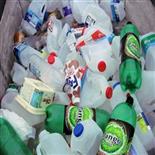
Why Is Plastic A Problem:
Plastic is one of the worst polluters as it doesn’t easily degrade and remains in the environment for a very long time.
Plastic bags cause a great deal of problems as they are given away with just about every purchase we make. An estimated 1million marine animals are killed each year by plastic bags.
The best solution is to buy a reusable “bag for life”, available at most supermarkets, you can take these with you every time you shop.
Most household plastic bottles (with only a few exceptions) can potentially be collected for recycling.
However the difficulty with recycling plastic is that the large number of polymer types make separation of items difficult. This leads to high levels of contamination, meaning the end product is of less value and cant be used in as many products.
Another problem is because they are light yet bulky, the weight to volume ratio means they become uneconomical to transport them long distances.
What happens to plastic when it is recycled?
Stage 1
Plastic bottles are deposited in the recycling banks.
Stage 2 - Plastic bottles are collected from the recycling banks and transported to a ‘materials reclamation facility’ (MRF).
Stage 3 - The bottles are sorted into different types of plastic.
Stage 4 - Bottles are squashed into tightly packed blocks.
Stage 5 - Powerful bailing machines squash the air out of the bottles to make them easier to transport.
Stage 6 - The plastic is then transported to a reprocessing factory where it is granulated.
Stage 7 - The granulated flakes of plastic are then made into new products such as garden furniture, fleeces, pipes and coat hangers.
Why recycle plastics?
Cuts waste disposal costs.
Less waste is sent to landfill sites.
Saves finite oil reserves.
If plastic bags are made from recycled rather than virgin polythene energy consumption is cut by about a third.
Before you bin it:
Wash the bottles.
Squash them flat so they do not take up as much room.
Look for the triangle symbol which indicates the type of plastic (see over) and check that this material is accepted.